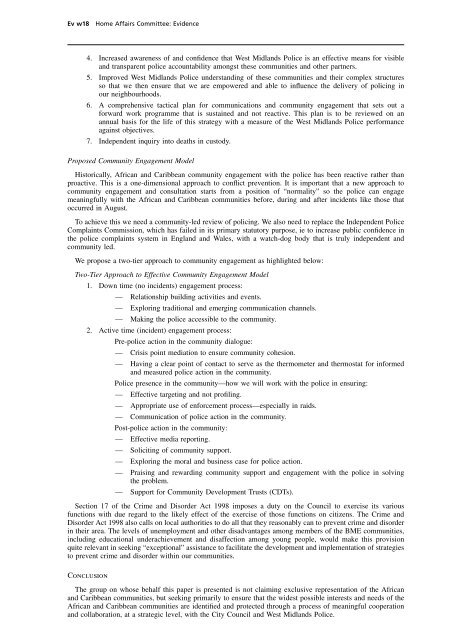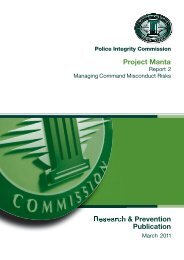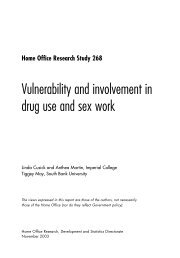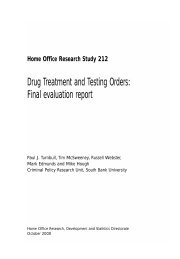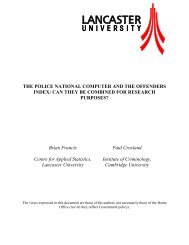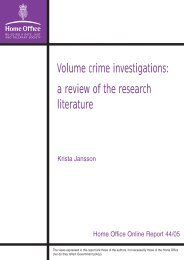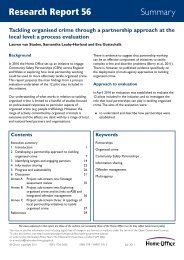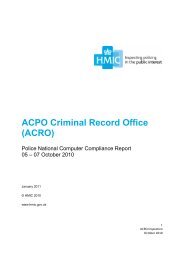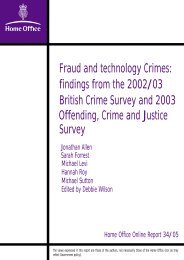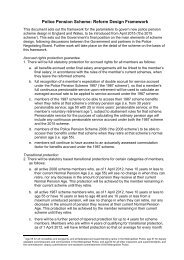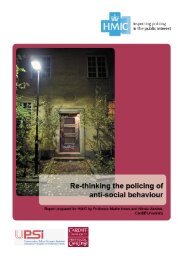Policing Large Scale Disorder: Lessons from the disturbances of ...
Policing Large Scale Disorder: Lessons from the disturbances of ...
Policing Large Scale Disorder: Lessons from the disturbances of ...
Create successful ePaper yourself
Turn your PDF publications into a flip-book with our unique Google optimized e-Paper software.
Ev w18 Home Affairs Committee: Evidence<br />
4. Increased awareness <strong>of</strong> and confidence that West Midlands Police is an effective means for visible<br />
and transparent police accountability amongst <strong>the</strong>se communities and o<strong>the</strong>r partners.<br />
5. Improved West Midlands Police understanding <strong>of</strong> <strong>the</strong>se communities and <strong>the</strong>ir complex structures<br />
so that we <strong>the</strong>n ensure that we are empowered and able to influence <strong>the</strong> delivery <strong>of</strong> policing in<br />
our neighbourhoods.<br />
6. A comprehensive tactical plan for communications and community engagement that sets out a<br />
forward work programme that is sustained and not reactive. This plan is to be reviewed on an<br />
annual basis for <strong>the</strong> life <strong>of</strong> this strategy with a measure <strong>of</strong> <strong>the</strong> West Midlands Police performance<br />
against objectives.<br />
7. Independent inquiry into deaths in custody.<br />
Proposed Community Engagement Model<br />
Historically, African and Caribbean community engagement with <strong>the</strong> police has been reactive ra<strong>the</strong>r than<br />
proactive. This is a one-dimensional approach to conflict prevention. It is important that a new approach to<br />
community engagement and consultation starts <strong>from</strong> a position <strong>of</strong> “normality” so <strong>the</strong> police can engage<br />
meaningfully with <strong>the</strong> African and Caribbean communities before, during and after incidents like those that<br />
occurred in August.<br />
To achieve this we need a community-led review <strong>of</strong> policing. We also need to replace <strong>the</strong> Independent Police<br />
Complaints Commission, which has failed in its primary statutory purpose, ie to increase public confidence in<br />
<strong>the</strong> police complaints system in England and Wales, with a watch-dog body that is truly independent and<br />
community led.<br />
We propose a two-tier approach to community engagement as highlighted below:<br />
Two-Tier Approach to Effective Community Engagement Model<br />
1. Down time (no incidents) engagement process:<br />
— Relationship building activities and events.<br />
— Exploring traditional and emerging communication channels.<br />
— Making <strong>the</strong> police accessible to <strong>the</strong> community.<br />
2. Active time (incident) engagement process:<br />
Pre-police action in <strong>the</strong> community dialogue:<br />
— Crisis point mediation to ensure community cohesion.<br />
— Having a clear point <strong>of</strong> contact to serve as <strong>the</strong> <strong>the</strong>rmometer and <strong>the</strong>rmostat for informed<br />
and measured police action in <strong>the</strong> community.<br />
Police presence in <strong>the</strong> community—how we will work with <strong>the</strong> police in ensuring:<br />
— Effective targeting and not pr<strong>of</strong>iling.<br />
— Appropriate use <strong>of</strong> enforcement process—especially in raids.<br />
— Communication <strong>of</strong> police action in <strong>the</strong> community.<br />
Post-police action in <strong>the</strong> community:<br />
— Effective media reporting.<br />
— Soliciting <strong>of</strong> community support.<br />
— Exploring <strong>the</strong> moral and business case for police action.<br />
— Praising and rewarding community support and engagement with <strong>the</strong> police in solving<br />
<strong>the</strong> problem.<br />
— Support for Community Development Trusts (CDTs).<br />
Section 17 <strong>of</strong> <strong>the</strong> Crime and <strong>Disorder</strong> Act 1998 imposes a duty on <strong>the</strong> Council to exercise its various<br />
functions with due regard to <strong>the</strong> likely effect <strong>of</strong> <strong>the</strong> exercise <strong>of</strong> those functions on citizens. The Crime and<br />
<strong>Disorder</strong> Act 1998 also calls on local authorities to do all that <strong>the</strong>y reasonably can to prevent crime and disorder<br />
in <strong>the</strong>ir area. The levels <strong>of</strong> unemployment and o<strong>the</strong>r disadvantages among members <strong>of</strong> <strong>the</strong> BME communities,<br />
including educational underachievement and disaffection among young people, would make this provision<br />
quite relevant in seeking “exceptional” assistance to facilitate <strong>the</strong> development and implementation <strong>of</strong> strategies<br />
to prevent crime and disorder within our communities.<br />
Conclusion<br />
The group on whose behalf this paper is presented is not claiming exclusive representation <strong>of</strong> <strong>the</strong> African<br />
and Caribbean communities, but seeking primarily to ensure that <strong>the</strong> widest possible interests and needs <strong>of</strong> <strong>the</strong><br />
African and Caribbean communities are identified and protected through a process <strong>of</strong> meaningful cooperation<br />
and collaboration, at a strategic level, with <strong>the</strong> City Council and West Midlands Police.


